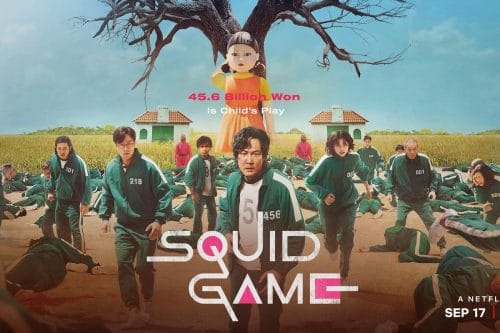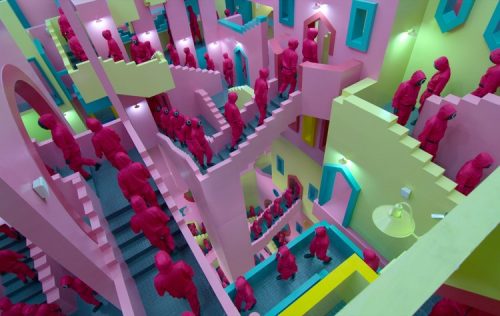K-drama review: Squid Game

This is not the light, fluffy fare I usually review but it was still very much up my street. Squid Game (Netflix 2021) is a brutal, violent horror story that satirises capitalism, in particular how the rich prey on the desperation of the poor.
Usually when I write a K-drama review I can reveal the plot of the first two or three episodes – in fact, it’s often necessary to explain the concept of the show. And they’re not usually the type of shows that can be spoiled by knowing the storyline going in. But Squid Game is both shorter than most K-dramas and, as is common in the horror genre, contains many reveals and plot shenanigans from early on that it would be a shame to know before having watched any of it.
That said, it’s going to be difficult to review it without at least talking about some details from after the middle of episode one. I will try to keep it vague but I may have to write a second spoilery post.
Squid Game starts out very serious in tone, and a little understated. (It reminded me of Misaeng in tone and directorial style in the opening act.) We meet our lead character Seong Gi-hun (played by Lee Jung-jae) who is divorced and living with his mother, struggling to make ends meet as he has racked up gambling debts. After a rare big win he is pickpocketed, meaning he can’t afford to buy his daughter a birthday gift. So he’s in a bad place when a strange man in the subway invites him to play a children’s game for a lot of money.
Gi-hun of course says yes and is collected the next day by a van that whisks him off to a secret location, where he meets all the other players, 456 in total, who are all in debt. They include his old childhood friend Cho Sang-Woo (Park Hae-soo, who had a small role in Legend of the Blue Sea), who Gi-hun thought was in the US with a successful career in finance. He also finds his pickpocket Kang Sae-byeok (Jung Ho-yeon), a North Korean defector.
This show really is about its central characters and does a good job of giving them arcs from slightly caricatured, to more complex, to pushing them via extreme situations to reveal who they truly are. It isn’t realistic but, unlike many K-dramas, it never feels silly.
The strange horror set-up (and I’m deliberately evading the details here) operates as a kind of social commentary. We learn about various causes of debt, including hospital bills and being an illegal immigrant exploited for cheap labour. But the point isn’t laboured over – mostly because the drama is more interested in showing us the games themselves than the reasons for them.

I love the architecture of the secret location. It’s all childhood-inspired, from the dormitory with playful murals to the weird paths players take to the games that are like a soft play centre crossed with an Escher print. And of course the outfits of the mysterious masked enforcers of the games have become instantly iconic.
To say much more would ruin the fun for those of you who haven’t watched this yet. It’s very dark, a little surreal and brutal. If you can handle those things, I add my recommendation to all the others out there.